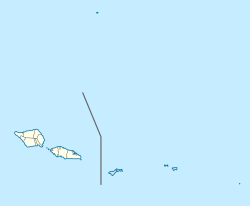Apia
| Apia | |
|---|---|

Early-October 2004 view of the Samoan government buildings in Apia
|
|
 Map of Apia |
|
| Map of Apia | |
| Coordinates: 13°50′S 171°45′W / 13.833°S 171.750°WCoordinates: 13°50′S 171°45′W / 13.833°S 171.750°W | |
| Country |
|
| District | Tuamasaga |
| Constituency | Vaimauga West and Faleata East |
| Founded | 1850s |
| Became Capital | 1959 |
| Area | |
| • City | 47.80 sq mi (123.81 km2) |
| • Urban | 20.0 sq mi (51.8 km2) |
| Elevation | 7 ft (2 m) |
| Population (2011) | |
| • City | 36,735 |
| • Density | 770/sq mi (300/km2) |
| • Urban | 36,735 |
| • Urban density | 1,800/sq mi (710/km2) |
| Time zone | UTC+13:00 (UTC+13) |
| • Summer (DST) | UTC+14:00 (UTC+14) |
| Climate | Af |
Apia is the capital and the largest city of Samoa. From 1900 to 1919, it was the capital of German Samoa. The city is located on the central north coast of Upolu, Samoa's second largest island. Apia is the only "city" in Samoa and falls within the political district (itūmālō) of Tuamasaga.
The Apia Urban Area has a population of 36,735 (2011 census) and is generally referred to as the City of Apia. The geographic boundaries of Apia Urban Area is mainly from Letogo village to the new industrialized region of Apia known as Vaitele.
Apia was originally a small village (the 1800 population was 304), from which the country's capital took its name. Apia village still exists within the larger modern capital of Apia which has grown into a sprawling urban area with many villages. Like every other settlement in the country, Apia village has its own matai chiefly leaders and fa'alupega (genealogy and customary greetings) according to fa'a Samoa.
The modern capital Apia was founded in the 1850s and has been the official capital of Samoa since 1959.
The harbor was also the site of an infamous 15 March 1889 naval standoff in which seven ships from Germany, the US, and Britain refused to leave harbor while a typhoon was clearly approaching, lest the first moved would lose face. All the ships were sunk, except the British cruiser Calliope, which barely managed to leave port at 1 mile per hour and ride out the storm. Nearly 200 American and German lives were lost, as well as six ships sunk or damaged beyond repair.
Western Samoa was ruled by Germany as German Samoa from 1900 to 1914 with Apia as capital.
In August 1914, the Occupation of German Samoa by an expeditionary force from New Zealand started. New Zealand then governed the islands as the Western Samoa Trust Territory from 1920 until independence in 1962 – firstly as a League of Nations Class C Mandate and after 1945 as a United Nations Trust Territory.
...
Wikipedia

